Brigadier John Geoffrey 'Joe' Starling was born in 1928. He was the only son of "Mr and Mrs. G.P Starling" and was "in his mother's words: "Crazy about the Army". He attended the Army School of Physical Training, Aldershot as a Cadet in 1944 whilst the war was still raging. He attended Advanced Physical Training Course no.5 from August 31 to September 10 of 1944. Having passed all ten tests, and failing none, he was described thus:
"This cadet is a natural leader. He is well disciplined, good mannered, clean, hardworking and most reliable. He studies his tables well and applies them with plenty of life and has firm control of his class. He demonstrates well and sets a good example to his class with his fine bearing. Qualified to wear cross swords". His classification was "outstanding" and his Army career was to be one equalled by only a few.
Colonel commandant of the ASPT W.P Bradley Williams added of Joe: "[he] should make a good Assistant PT. Instructor on entering the Army & after a period of experience as an A.I. he might usefully be considered for the Army Physical Training Corps".
Joe was then made a (War Substantive) Second Lieutenant on a TARO commission on January 11, 1945 whilst still a cadet in the 5th Cadet Battalion, the Cambridgeshire Regiment. On August 31st, 1946, he relinquished his TARO commission as he prepared to enter the RMAS and subsequently the Army proper. Despite earning a place at St Catharine's college, Cambridge, he decided "to make the Army his career" according to a contemporary newspaper article. Over the next two years he trained at the RMAS. Then on October 21, 1948 he was commissioned into the 1st Battalion, Suffolk Regiment as a Second Lieutenant. Before heading to Malaya, he served in Greece where, as a temporary Company Commander, he "was responsible for some hundred souls in the Greek Civil War", which he described as "a sobering experience". He was deployed to Malaya in May 1949 after the Emergency broke out. By Wednesday, 24 August 1949, Joe was part of a group that had "killed three bandits and wounded several more". This was one of Joe's first encounters with the 'Kajang Gang' - a Communist group from a suburb of Kuala Lumpur who were led by Liew Kon Kim. Kim was nicknamed the "bearded wonder" by the British press and allegedly feared by the locals for his magic powers. He was to be a major target for the Suffolks over the following three years.
Very quickly, Joe proved the high accolades awarded to him by Williams were not misplaced. As an exceedingly green platoon commander in Malaya he earned the Military Cross for an action on November 30, 1949 at Batu Caves in Selangor (awarded February 24, 1950 with this citation):
"On 30 Nov 1949 2/Lieut Starling was in command of a patrol operating on the jungle edge about 8 miles North of KUALA LUMPUR. Starting at dawn the patrol had been moving through very difficult country for five miles without a halt when at midday as they were climbing a steep hill in open formation they came under fire from several bandits. Fire was immediately returned while a party led by 2/Lieut Starling moved round to a flank and charged up a very steep and overgrown hill with great speed and determination. The bandits completely surprised, turned and fled incontinently, abandoning everything except their clothing and arms
At the top of the hill a track leading away from the position was found and 2/Lieut Starling set off to follow this up at all possible speed. This track through thick undergrowth led them to a camp after about a mile which was covered in 15 minutes. This camp was empty but just beyond over a further ridge a large camp was found in which some bandits were seen to be in the process of packing. The only entry to the camp was up a steep and narrow stairway in a high bank and up this 2/Lieut Starling led his patrol in a charge. On reaching the top bandits were seen only 15 yards away and 2/Lieut Starling immediately opened fire wounding one bandit; his fire was returned by several automatic weapons and from one of these (a Sten Gun) he received a slight wound in the face. In spite of this his immediate reaction was to continue his advance firing as he went and shouting to his patrol words to the effect that he had been hit which was all the more reason for destroying the bandits. Unfortunately when faced with this charge, bandits showed greater speed than courage and though blood trails were followed for a considerable time these were eventually lost. On completion of the engagement, in spite of his wound 2/Lieut Starling walked two miles to a telephone to report what had occurred and then returned to his patrol and carried out a most thorough and painstaking search of the area for several hours, during which anything of value was collected. He brought his patrol back to its base an hour after dark and even then it was only after seeing them settled down for the night that he allowed himself to rest and got his wound attended to.
Throughout the engagement 2/Lieut Starling showed a very high degree of personal courage, skill and leadership while his endurance and energy throughout the day were worthy of the highest praise. His complete disregard for his own safety and his great drive and enthusiasm were an inspiration to all the members of his patrol.
Apart from this particular operation, 2/Lieut Starling, throughout the time he has been on operations in Malaya, has consistently shown a standard of skill and energy and leadership in commanding his platoon which has earned him the respect and admiration of all ranks.
Further details of Joe's actions in Malaya are afforded to us by a Cambridge Daily News article from January 20, 1953. It is important to note that this was not the action he received the MC for as is claimed:
[The 'Iban' trackers mentioned are an indigenous group initially from the island of Borneo. They eventually joined the Sarawak Rangers, a regiment of the British Army, and then the Malaysian Army after independence. Their scouts were widely renowned and were attached to many British units. One of them, Awang Anak Raweng, earned the George Cross]
"it was due to the exceptional skill of an Iban tracker and the silent approach of a small Suffolk patrol led by Lt. John Starling, of Cambridge, that two terrorists who took part in the brutal murder of three civilians near Kajang in December, 1950, were themselves killed within 24 hours. Lt. Starling received the M.C. for his part in the action; he is now stationed at Bury St. Edmunds. This immediate follow-up was of incalculable value in boosting civilian morale. The patrol - from 11 platoon of "D Company - were given the direction in which the terrorists were believed to be heading. After about an hour's patrolling the Iban tracker noticed what he thought was a human footprint on a wild pig track, so the patrol went into the swampland for 100 yards. Suddenly, the Iban stood stock still. He whispered he smelt tobacco smoke. The soldiers crept up and when the leading man was only 15 yards away from a little palm leaf camp, one band came out - and was killed with the first round: the second suffered the same fate.
Shortly after that action, I saw the ground on what was probably the swiftest nemesis suffered by terrorists in Malaya. Within minutes of them robbing villagers of their identity cards and brow-beating them to provide food on their return, a flash was received at a police post. The Suffolks sent out a patrol at once and within a couple of hours of the terrorists moving out of the village, the small patrol saw them approaching. "We got into instant ambush positions, and but for a terrorist seeing one of the men might have had them all" explained the officer [Joe]. As it was they got four out of the five terrorists."
Another clipping describes the same event with more quotes from Joe:
"On the strength of the Iban's observation, the patrol entered the swamps. After a time the Iban stopped the patrol and whispered that he could smell tobacco smoke, even although no one else could pick up the scent. "We carried on in the direction of the smoke and then came to an empty camp containing four bamboo beds and some rice" said Lieut. Starling. By this time it was raining hard, and it appeared obvious that the bandits had moved further into the swamps. "We carried on in the direction of yards and then sighted a hut." he went on. "When we were less than 15 yards away an armed man came out. He was killed with the first round." A second man then ran from the hut and he, too, was killed. A third man, who was out of sight, fired a burst from a Sten and then fled".
The Iban tracker's name was revealed in a third newspaper clipping to be 'Marten'. For these and other actions Joe earned his progression to a Lieutenant on October 21, 1950.
Finally, the First Battalion, Suffolk Regiment, left Singapore for England aboard the troopship Georgie, 3 and a half years after they had arrived (probably January 20, 1953). A report declared, "the Suffolks have killed or captured more than any other battalion in Malaya" - a British Pathé reel stated that the number of terrorists killed or wounded by the Suffolks was 183. Crucially, this included the Communist leader Liew Kon Kim, who had been killed by Second Lieutenant Raymond Hands in July of 1952.
After returning home from Malaya, the Suffolk regiment received a visit from Princess Margaret, their Colonel-in-Chief, and gave her a guard of honour in July 1954, which was commanded by Joe. The Princess was presented with a lavish regimental brooch studded with diamonds, rubies, emeralds and sapphires, which 1300 men from the regiment paid for. Joe was then made a Captain on October 21, 1954. The Suffolk Regiment was moved to Wuppertal in Germany in the same year to serve with the British Army of the Rhine for two years. In 1956, in its last overseas tour as a Regiment, the Suffolks were sent to Cyprus to take part in the EOKA campaign. With Cyprus looking ever more likely to become independent, the Suffolk Regiment returned home. They merged with the Royal Norfolk Regiment in 1959 to become the 1st East Anglian Regiment (Royal Norfolk and Suffolk). Now in the 1st EA, Joe was made a Major on October 21, 1961. It was on November 20, 1963 that he would eventually transfer to the 1st Battalion, the Parachute Regiment, retaining the rank of Major. Now 35, he had many years of leadership ahead of him and would take to parachuting as a complete natural. Perhaps making up for lost time, he would later complete more than 600 parachute jumps and once completed 110 in a single year.
But to begin with, 1 PARA were posted to Cyprus as part of a UN Peacekeeping tour in the early months of 1964. Nicosia, the capital of Cyprus, was to be the crucible in which Major Starling would find his feet in 1 PARA as the commander of a rifle company during the emergency operations. It was to be a very different atmosphere from Malaya. A newspaper clipping written by Peter Moorhead from Friday, February 28, 1964 captured the scene:
"The Lone Major Stops a Battle
Major Joe Starling was just the touch of a finger from death today as he walked between angry Greeks and Turks who were facing each other with rifles at the ready. But Major Starling, aged 36 and cool as an icicle, ignored his own danger, raised his arms and shouted: "Come now, gentlemen! Let's not start shooting! We can talk this over peacefully." From the gardens and houses of suburban Plastiras Street in Nicosia 15 Greeks and 20 Turks peered out suspiciously. Then both sides uncocked their guns.
The ugly situation blew up when Greeks accused Turks of looting a Greek house in the street, which is on the cease-fire line dividing the two sides. A full-scale battle was about to break out when Major Starling, of the 16th Paratroop Brigade [sic], raced up in a Land-Rover. After a 45-minute talk, Cambridge-born Major Starling and two other paratroop officers persuaded the Greeks and Turks to disperse. Major Starling, whose wife and two children live at Aldershot, said afterwards: "All I wanted to do was stop them shooting each other".
After returning from Cyprus, Joe was posted to the 44th Independent Parachute Brigade (TA) as their DAA and QMG. His task was to prove that the Brigade should be retained in the forthcoming rationalisation of the Territorial Army which would see many units reduced or even made extinct. A contemporary account stated:
"During the past twenty months Major STARLING has devoted the whole of his energy, knowledge and experience to meeting the needs of individuals and units. He has done this at great personal sacrifice, and his efforts on behalf of the formation have gone far beyond what is normally expected of a staff officer in peacetime".
It later noted that he was seen as the best DAA and QMG the 44th Brigade had ever known. Later he led a Company Group in an exercise in Libya with the 3rd Division in October 1965. He finished his term as QMG in February 1966 and rejoined 1 PARA. Evidently he had made an impression because on June 11, 1966, he was made a Member of the British Empire. That year, he was responsible for raising D (Patrol) Company who were to be sent to Indonesia during the Confrontation with the Malaysia. These patrol companies were being formed by each Parachute Battalion to help the SAS Squadrons who were being overwhelmed on the Borneo border. In the event, the conflict ended just after the company embarked and before they could get there.
When the Battalion deployed to Aden on May 22, 1967, Joe went as second in command to the CO Mike Walsh, with whom he worked exceedingly well. Their challenge over the previous months was to get 1 PARA into fighting shape, and they developed a training programme with that in mind. Whilst in Aden, Joe was to tour Area North of Sheik Othman (1 PARA's area of operations), ensuring that the various Observation Posts and Checkpoints were well supplied. He was well remembered for his time in Aden, as this anecdote from 1 PARA's 50th anniversary booklet illustrates:
"Joe sent Col Mike 100 miles up country to a hill station at Dhala for a day’s break and a good lunch in a renowned rest house. At the time of the CO’s departure there were no incidents in the log or marked on the Ops Room map. All was quiet. After an interesting day out the CO returned that evening refreshed – on the final approach to RAF Khormaksar in the AAC Beaver, it passed over Sheik Othman and the CO saw clouds of smoke over the town and Army vehicles racing up the causeway. On Touchdown, the CO was met by his Landrover crew. The first words of his signaller, Cpl Coughtree, were: “There is a General Strike in Aden, trouble in Daar Said and Sheik Othman is in flames. Major Starling just sent this signal as you were taxiing in. ‘Tell Sunray not to worry, I have it all under control!’ Oh yes sir, he hopes that you had a good day!"
Joe's sense of humour was also on display in this slightly more hazardous incident:
"On one occasion, the Padre was accompanying the Second-in-Command on a visit to forward Company when a shoot-out started and the party was obliged to take cover. Padres do not bear arms under the Geneva Convention, but on this occasion someone had given the Padre a grenade and pulled the pin. He crawled up alongside the Second-in-Command, who was The CENTURIONS “Our Last Hurrah” 19 busy directing fire on to the terrorists, carrying the grenade. ‘What shall I do with this? he asked. The answer was not recordable but happily he had played cricket in his youth and scored a good hit on an enemy firing position. Nonetheless, the Second-in-Command made a mental note to confine the Padre to more pastoral duties in the future."
During the famous firefight at Al Noor Mosque on June 1, Joe was responsible for the main ammunition resupply that occurred after last light. Furthermore, he was the progenitor of the idea for "Operation Biglift" - the not inconsiderable task of attaching a mesh screen to Observation Post 4 to protect it from Blindicide (rocket) attacks. Located in the tower of the Police Station at the centre of Sheikh Othman, this OP was particularly vulnerable to attack. Prior to this, a rocket had hit a corner post and injured 4 people, one seriously.
At Joe's instigation, the mesh screen was designed and created by Lt Richard Fawcus. The idea was that the rocket would hit the screen, leaving only splinters to damage the tower. But the whole thing had to weigh less than 1000 pounds so that it could be lifted into position by a Scout helicopter of 13 flight, Army Air Corps. Building the mesh in the conventional way over weeks would have exposed those working to intolerable attacks. After it was eventually constructed by 60 Field Squadron RE, their sappers had to catch the guide ropes as the Scout passed overhead. With two companies of 1 PARA witnessing from the rooftops just before dawn, the Operation was a complete success. The platoon stationed at OP 4 suffered no more casualties, despite the perseverance of enemy Blindicides.
However the tour in Aden was not at all an easy one. The only time Joe was able to use a 76mm gun on his Saladin armoured car was after the Foreign Secretary himself, George Brown, had been called up (he was known for being unreliable). Joe also found looking on whilst NLF forces massacred the rival FLOSY very difficult to bear:
"It was tragic to see truckloads of ashen faced FLOSY supporters being taken into the desert (and hence outside the area still controlled by the British) and to hear the long bursts of machine gun fire as they were executed by the NLF. A clandestine patrol from 1 PARA launched from Dar Said reported mass graves being dug up by some scavenging dogs who fed on the corpses".
1 PARA returned from Aden in late November 1967. In recognition of his diligent patrols and ingenuity in instigating Operation Biglift, Joe was awarded a Mention in Despatches for gallant conduct in South Arabia on January 23, 1968. As a mark of further recognition, he became a Lieutenant Colonel on December 31, 1968. From 1968-9 he commanded the Parachute Regiment Battle School at Brecon, South Wales.
After this was a stint at 15 PARA (SV) (Scottish Volunteers) from 1969-1971. During this time, Joe spoke in his memoir of a particular difficulty at interpreting the Glaswegian accent. But he later became a much loved Commander, as the Pegasus Journal of April 1971 recorded:
"Joe Starling has gone to the School of Infantry at Warminster. His going was sudden, perhaps the best for such a man of action. There was barely time to pack a spork in the right-hand top pocket of his smock and the first Regular Colonel of this fiercely independent Jock Battalion was gone.
He leaves us an unforgettable legacy of soldering. The Jocks always had an iron-hard reputation among Airborne Battalions, but Joe took this rich raw material and began to refine it into a sophisticated fighting machine. His achievements in ex-Marshmallow still echo through B.A.O.R. Every man loved him"
Further comment was made of Joe's time there in the 15 PARA historical booklet, 1947-1993:
"With a dearth of officers carrying the necessary seniority, 15 Para was persuaded to accept a Regular CO. The only stipulation was that he must be English so that he was neutral between Lowlands and Highlands. And so in 1969, Joe Starling came to 15 Para in a whirlwind command which left many breathless but all in admiration of his remarkable skills as a soldier. Joe's biggest problem was his lack of language skills. He had soldiered with distinction in the Middle East, the Far East, the Gulf, Cyprus and Aden but he did not speak a word of Jockinese. His most serious test was his first dinner night when Pipe Major Alex Crawford invited him to select a tune in a tongue he could not fathom. He chose Scotland the Brave only to be told it had just been played and then Heilan' Laddie which met with stern disapproval as a Campbell tune. Finally he admitted defeat and gave the Pipie freedom to choose his own. But Joe Starling was a soldiers' soldier and quickly mastered such difficulties. The Jocks recognised a superb leader of men and when he died at the end of 1996 he was mourned by all the Jocks whose difficult hearts he won so convincingly".
He was made a Colonel on June 30, 1972, joining the Royal Regiment of Wales. This enabled him to become Deputy Commander of the 3rd Infantry Brigade based in "a disused industrial building in Lurgan" (Northern Ireland).
From 1972 to August 15, 1975, Joe was Regimental Colonel of the Parachute Regiment at RHQ, responsible for a number of administrative duties. During this time, he ran a Parachute Assault Exercise which involved two Battalions of the Parachute Regiment plus a French Company, a German Company and the GPC joined together in a third. This third 'Battalion' was to organise a counter-attack, requiring one of its companies to 'retreat' as a pretext. The French refused, the Germans refused and only the Guards Parachute Company was left to do the honourable thing. When they tried to refuse as well, Joe merely pointed to his badge, settling the matter. He handed over as Regimental Colonel to Col. Gerard Mullins.
After leaving he was set to join the Special Forces Branch of the Supreme HQ Allied Powers in Europe (SHAPE), which was based in Belgium. First, he had to take a six month NATO course at their Defence College in Rome where he was part of committee no.6. On completion he became Chief of the Special Projects Branch at SHAPE, becoming part of the staff of General Alexander Haig, who would later become a US Secretary of State.
From June 16, 1978, Joe was Deputy Commander, South West District under GOC Major General John Acland. He held this post until June 1, 1980 and was recommended for the CBE by Acland himself, which he was awarded on December 31, 1980, with this citation:
"Brigadier Starling has now been Deputy Commander South West District for 2 years. Some 10 major and 15 minor Regular and TA units come directly under his command; he has been Commander Bulford and Tidworth Garrison - the largest single military concentration in the United Kingdom - and he holds special responsibility for the 220 ACF and CCF units in the District which contain over 11,000 young men.
He has effected a remarkable transformation in all the areas of his responsibility since taking up his appointment and, in so doing, his name has become synonymous in the District with the ideals of dedication, enthusiasm and service. Not only in the hierarchy of the TA and Cadet organisations but right down to individual soldiers and cadets he is held in the highest respect and spoken of with awe but with the deepest affection. He has achieved miracles for their morale and their efficiency.
That this is so is because of the almost incredible amount of time and effort he has been prepared to expend on their behalf. Often driving himself over very long distances he has given up innumerable evenings in each week and one weekend after another - once no less than twelve in a row to visiting training or to giving instruction and encouragement; and all this has been in addition to the outstanding performance of his endless and diverse duties as Deputy District and Garrison Commander and also to his services to the British and Army Parachute Associations which could alone justify recognition.
From December 1979 to March 1980 the duties of GOC South West District devolved upon him in the absence of the GOC in Rhodesia. His efforts were prodigious; he continued to carry out all his normal tasks with no diminution of enthusiasm and yet managed to exercise command and direct the staff with full success. He is an officer of outstanding energy and loyalty.
The range of his achievement is thus enormous but is commensurate with the quite exceptional effort and selfless devotion he has been prepared to put into it. From Lord-Lieutenants to 13 year old cadets, the recognition of his outstanding service by an award would be universally acclaimed with delight, as it would also be by every serving officer in the District. He leads by example and is himself an example of leadership: indeed he sets a standard, all too seldom seen, of totally unselfish service to a cause and to others with no thought whatever of the cost to himself."
Joe received the CBE at an investiture in 1981, where he recalled the actress Margaret Lockwood was also present ("she was dying for a fag and began rummaging in her handbag for the makings"). He also remembered a Rear Admiral telling him "Brigadier, your flies are undone!".
On June 27, 1980, Joe was made Aide-de-Camp to the Queen in succession to Brigadier John Whitehead. He finished in this post when he retired from the Army on July 31, 1981. He had an active retirement in the TA, being appointed honorary Colonel in the 155 Wessex Transport Regiment, RCT (V) on April 1, 1982, where he served as a secretary.
Brigadier John Geoffrey Starling died in 1996.
Compiled with information from:
Soldier On! The Testament of a Tom by Joe Starling
London Gazette
Airborne Assault Archive (Box 2.C.4 27.1.56 and Box 2.B.4 26.15.1)
Suffolkregimentmuseum.co.uk
Suffolk Regiment Museum Facebook Page
Aden Insurgency: The Savage War in South Arabia 1962-67 by Jonathan Walker
1 PARA Aden 50th Anniversary Booklet, Aldershot 2017 (Stuart Hepton, Major Kerry Seekings, Margaret Seekings, Hamish McGregor and others)
Pegasus Journal, April 1971, p. 4.
15 PARA 1947-1993 (published 1997), historical booklet written by Alasdair Hutton
Article written by Alex Walker
Read More

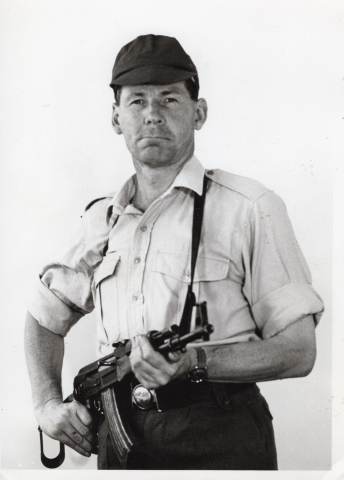
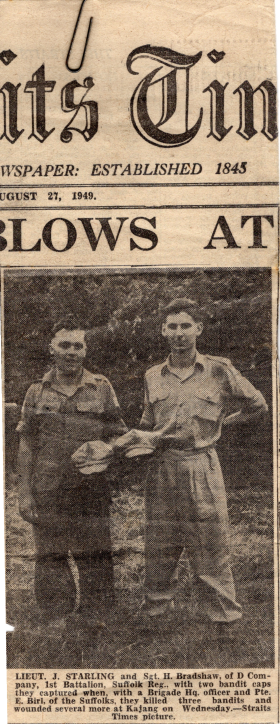
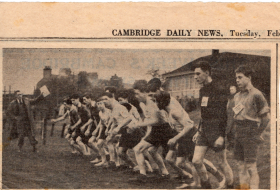
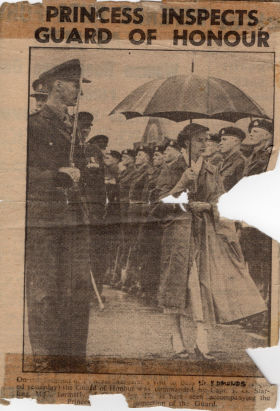
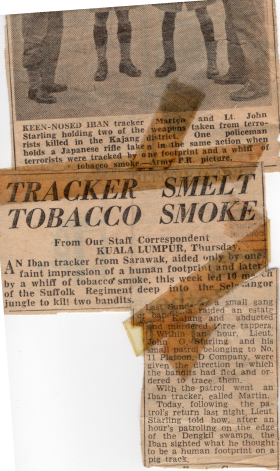
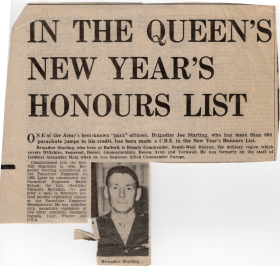
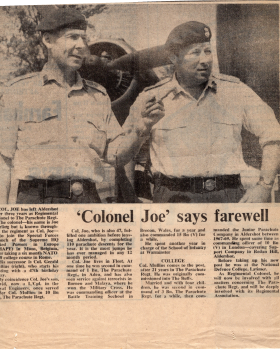
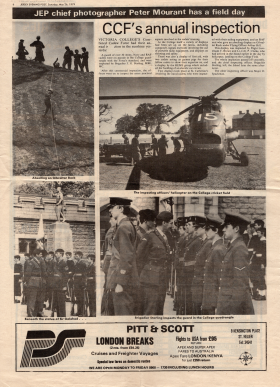
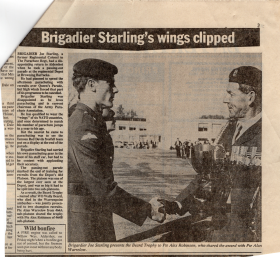
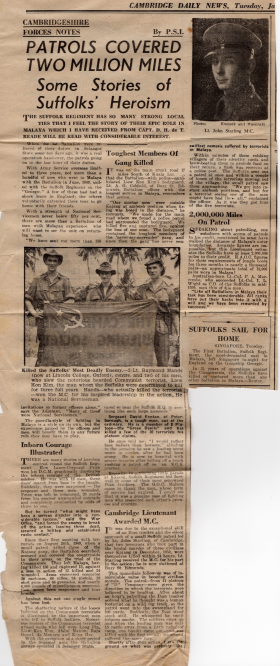
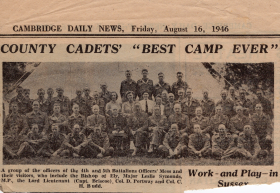
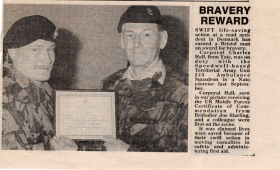
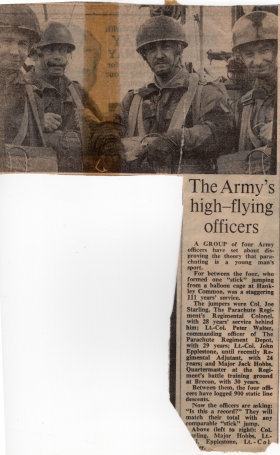
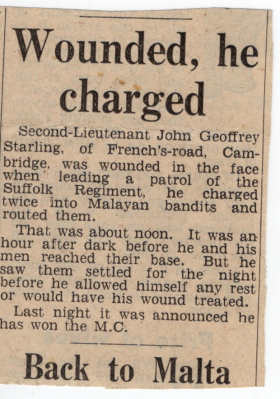
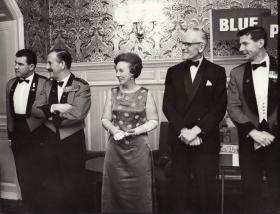
Latest Comments
There are currently no comments for this content.
Add Comment
In order to add comments you must be registered with ParaData.
If you are currently a ParaData member please login.
If you are not currently a ParaData member but wish to get involved please register.